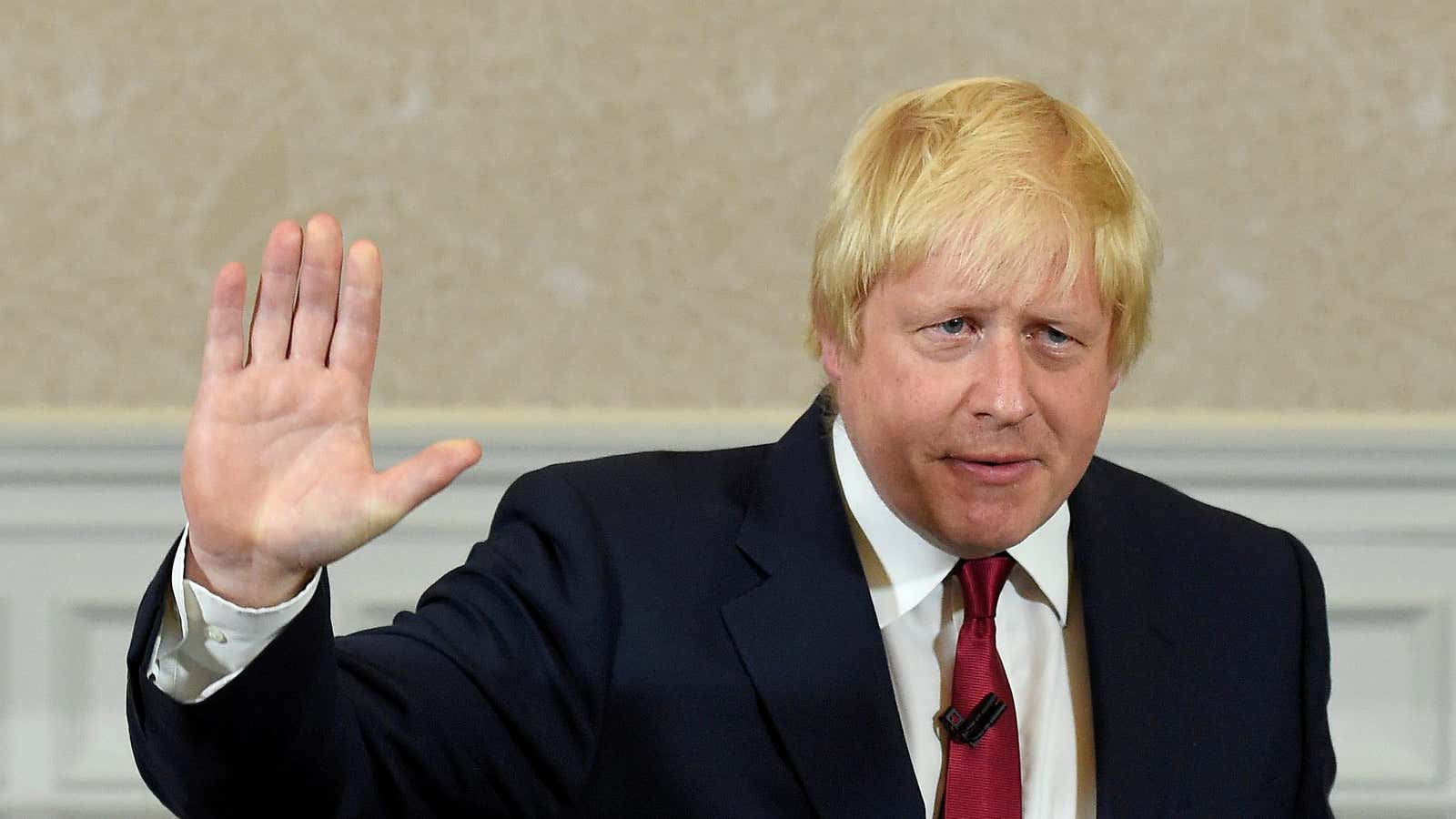First, there were incredulous—and somewhat unkind—reactions from the rest of the world. Then there was a terror attack in Nice to respond to, then an attempted coup in Turkey. British politician Boris Johnson has not had an easy start as foreign secretary of the United Kingdom.
A quick recap: Johnson, the former mayor of London and one of the leaders of the UK’s campaign to withdraw from the European Union, was made foreign secretary last week, July 13, in the newly-formed government of prime minister Theresa May. Soon after the announcement, reactions from the rest of the world started rolling in. A UK member of parliament was publicly stunned, a German news presenter had to hold her laugh and a former Swedish prime minister openly wished the announcement was a joke.
The most pointed reaction came from Africa, where Johnson’s past statements have been particularly offensive, including mention of “watermelon smiles.” Upon news of his appointment, Ugandan government spokesman Ofwono Opondo disparaged the whole country to the Wall Street Journal:
Boris Johnson’s opinion that countries like Uganda would be better off as a colonies is inconsequential. We would be more concerned if the US or Russia appointed someone like Boris. But Britain no longer wields much power globally, that’s why they have run away from the EU.
But now that Johnson is the nation’s authority for foreign and commonwealth affairs, he appears to be watching his tongue. In just a few days in office, he has already shown unexpected calm and measure in dealing with major international issues.
His first assignment as foreign secretary was a visit to the French ambassador’s Bastille Day party in London on Thursday, July 14. He was applauded and booed during his first official speech, given in front of the embassy, but did little to offend. Later, as news of that evening’s tragic truck attack in Nice arrived, Johnson reacted as a sensible politician, saying:
Obviously, our thoughts are very much with the people of France and Nice, and an absolutely appalling incident. I think there will be ministerial meetings later on today to discuss the implications for this country. I don’t know any read across or implications for the UK. Clearly, this represents a continuing threat to us and the whole of Europe and we must meet it together.
Then on Friday (July 15), came Johnson’s second major international crisis in two full days of work, an attempted military coup in Istanbul, Turkey. Sensibly, he made no mention of the goat-sex joke that he famously wrote about Turkish president Recep Tayyip Erdoğan, earlier this year.
Johnson also instructed Britons living in Turkey to seek information with the UK’s Foreign and Commonwealth Office.
If he can keep up the good work, there are only a few more gaffes from his past that remain potential pitfalls in the coming weeks’ most pressing diplomacy issues:
If he hopes to air any opinion over the contentious recent UN ruling that China’s claims on the South China Sea are illegitimate, Johnson will surely hope that thin-skinned Beijing forget his 2005 assertion that China’s rise to superpower status was “nonsense,” and that Chinese influence was “unlikely to increase.”
And after snide remarks in April this year about the United States’ current president Barack Obama’s “part-Kenyan” heritage, Johnson’s safest diplomatic strategy will likely be to give up on relations with the current US administration and start currying favor with the future president.
He’s made faux pas with both Republican nominee Donald Trump and Democratic nominee Hillary Clinton, but there’s still time to mend fences. In fact, he publicly supported Clinton’s 2007 campaign back when he was a member of parliament, despite also making sexist remarks about her appearance in an op-ed column for the Telegraph, including: “She’s got dyed blonde hair and pouty lips, and a steely blue stare, like a sadistic nurse in a mental hospital.” (As recently as 2015, he asked that those words be taken “with a light-hearted spirit.”)
It’ll be just a tad harder with Trump, who heads to the Republican National Convention this week. In 2015, after Trump suggested that Islamic radicalization had made areas of London dangerous, Johnson—then mayor of London—got personal during an appearance at MSNBC: “Crime has been falling steadily in both London and New York—and the only reason I wouldn’t go to some parts of New York is the real risk of meeting Donald Trump.”
